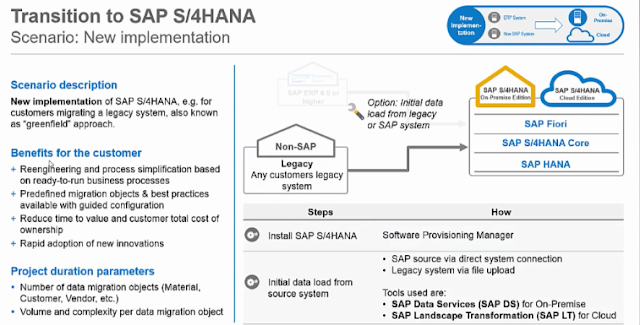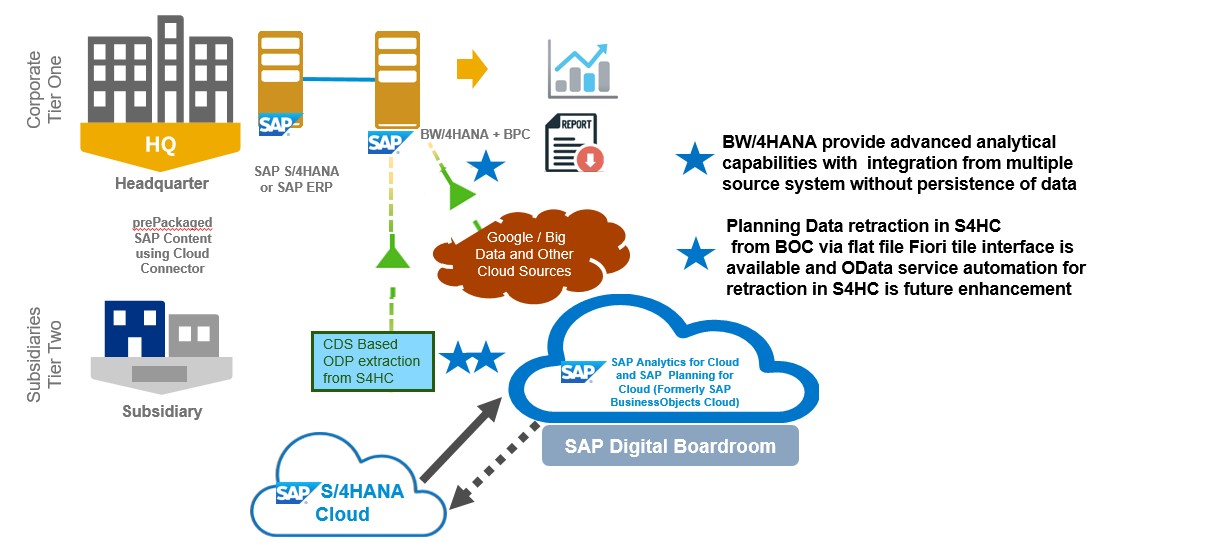SAP HANA Use Cases
SAP S4HANA is incredibly versatile. It can add value to a
wide range of business scenarios, and it can be deployed in myriad ways to meet
your project expectations and technical requirements. SAP HANA can also
complement existing landscapes and replace outdated solutions.With that versatility in mind, we’ll review four typical
use cases for SAP HANA deployments today, (Learn from SAP S4 HANA Training) as well as some of the potential scenarios for
the future. These use cases are:
Agile data marts
SAP business suite accelerator
Primary database for SAP Netweaver business warehouse
Custom application development
Agile data mart
One way to quickly get the most value from in-memory
technology is to use SAP HANA as a standalone data mart for a specific
use case. In this scenario, SAP HANA acts as a central hub, collecting
source-system data from multiple sources via in-memory technology and then
displaying focused reports and analytics via a reporting front end. The data
can then be used in multiple ways, depending on the organization’s reporting
requirements and formats.This arrangement has the advantage of providing a focused
solution to an immediate business problem while minimizing disruption to the
existing landscape. Such projects are usually completed quickly: The business
problem is understood, and the required data and source systems are easily
identified. Such installations offer instant value making previously difficult and
time-consuming tasks fast and easy.
SAP business
suite accelerator
SAP HANA is frequently used to accelerate transactions and
reports inside the SAP business suite. As with the agile data mart scenario,
SAP HANA is set up as a standalone system, side by side with the database
under the SAP Business Suite applications. In this scenario, however, SAP HANA
is used to “offload” some transactions or reports that typically take hours or
days to run, (SAP HANA Training by
Learn IT covers all basic implementations which industry uses) though it is not
used as the primary database under the application.As explained previous field of topics, certain transactions
or reports inside the SAP Business Suite can run slowly, primarily due to the
slow I/O of the underlying disk-based database and the huge data requests
required by these transactions or reports. To run its calculations and present
a result, a typical budgeting or planning transaction in SAP must collect data
from many different tables in the system. Reports can also be very
data-intensive, requiring extensive data from many tables dispersed throughout
the database. In both of these cases, the application must request the data
from the database, load it into a buffer table in the SAP application server,
run the algorithm or calculation, and then display the results to users.To overcome system latency that slows down these common
reports, SAP has developed “HANA fied” versions of several existing reports.
These reports consist of three preconfigured reporting dashboards and 23 reports
from the following business areas:
·
Financial reporting
·
Sales reporting
·
Purchasing reporting
·
Shipping reporting
·
Master data reporting
These dashboards and reports leverage existing reporting
capabilities from SAP ERP. However, they offload the physical processing of the
reports to a dedicated SAP HANA system that sits beside the live SAP ERP
system. All relevant tables for each dashboard or report are physically copied
from the SAP ERP system onto the SAP HANA system, which is then used to
generate the reports and display them to users in a variety of user interfaces.
Let’s review the key elements of each bundle.
Accelerated sales
& distribution reporting
The SAP HANA business content for Sales and Distribution (see SAP SD training overview) enables
sales managers and sales representatives to check basic key figures for sales in
real time. Whereas sales managers use sales analytics to access instant
overview information regarding the various performance indicators for their
sales teams, the sales representatives focus on detailed information relating
to the results of their sales activities.
Accelerated
financial reporting
The SAP HANA Financials content package provides the
prerequisites for building reports that provide the following analysis data:
- Real-time analysis of the subledger for Accounts Payable (FI-PA) and account receivable (FI- AR). Learn account payables and receivables from SAP simple finance training by Learn IT Training.
- Flexible analysis of customer and vendor items based on the single line items from the back- end ERP system.
- Calculation and analysis of the days sales outstanding (DSO).
- Note that currently only General Ledger Accounting (new) is supported.
The purchasing content package for SAP HANA enables
procurement managers to analyze key procurement processes in real time.
Procurement managers use spending key figures along different dimensions
including Material Groups, Vendors, Plants, and Purchasing Organizations to
gain instant insight into inefficiencies that may point to savings potentials or
internal and external process improvements.
Accelerated
master data reporting
Master data are essential for nearly all business
transactions, irrespective of the business area. The master data in this
package concentrate on master data objects that are available in SAP ERP, such
as material, customer, and vendor.
Accelerated
shipping reporting
The SAP HANA content for Shipping enables shipping
and warehouse managers to check basic shipping and stock key figures in
real time. Managers use shipping analytics to obtain instant information
for planning and monitoring outbound delivery-related activities. In
addition, the managers can get an up-to-date overview on materials stock
at any time.
SAP HANA
accelerates reports
Imagine a “long-running” SAP ABAP training report within a particular business function, one that’s
been an ongoing problem for users. As a result of system latency, many reports
could not provide real-time data analysis and therefore could not be used to
make proactive business decisions. SAP HANA can reduce a report’s run time from
several hours to minutes or even seconds, making the information much more
current and valuable.
Primary database
for SAP Netweaver business warehouse
In our third use case
example, SAP BW IS POWERED BY SAP HANA (SAP BW training ). In this scenario, a company replaces the
previously for
their SAP BW system with SAP HANA. The IT team can perform a standard DB
migration over to SAP HANA and then enable specific objects to be in-memory
optimized as necessary depending on the company’s requirements.SAP BW is the first SAP application that was optimized to
run with SAP HANA as its primary underlying database. With SAP HANA, SAP BW can
leverage in-memory capabilities for improved performance, without the need for
any sidecar accelerators or extensive modeling workarounds. The entire database
physically sits under the SAP BW system, eliminating the need for in-memory
aggregation. This arrangement simplifies the data modeling and query design,
which in turn greatly enhances system performance while lowering IT ownership
costs.Replacing an old database with SAP HANA generates speed and
flexibility for two key reasons. First, keeping the entire database in memory
eliminates the need to send large amounts of data between the application and
DB servers, thereby reducing latency. In fact, running SAP BW on SAP HANA
eliminates most of the problematic issues that slow down the system, from both
a user and an administrator perspective.
Custom
application for SAP HANA
As stated earlier, SAP HANA is a full-blown,
do-just-about-anything-you-want application platform. It speaks pure SQL, (want
to learn how implement queries learn
from SQL server training) and
it includes all of the most common APIs, so you can literally write any type of
application you want on top of it. There are a few rules and “guide rails” that
are designed to keep things from going wrong. Overall, however, the sky truly
is the limit when it comes to imagining what to build with SAP HANA. Although SAP HANA is valuable for a broad range of
applications, it “shines” particularly well in a few unique situations. If
you’re building an enterprise-scale application for a business scenario that
has high data volumes, needs detailed/granular data analysis, needs to search
or aggregate huge data volumes, requires complex algorithmic or statistical
calculations, or suffers from latency between transaction recording and
reporting, SAP HANA is a great choice.
Future use case
scenarios
As SAP HANA matures and SAP updates its portfolio of
solutions to take advantage of the extensive horsepower of SAP HANA, you can
expect to see nearly every SAP product supported naively on SAP HANA as a
primary database plus many more “native SAP HANA” applications.By now you must be having a good understanding of how
typical use cases take advantage of SAP HANA. The next step is to ensure that
you understand the best ways to deploy this new technology in your environment
to drive maximum value.
Learn IT Training is the world’s biggest
resource of learning platform online will teach you the industry used
technologies and methodologies and make you future ready in your chosen module
and chosen platform. You can open SAP training courses to know more about training options.
Register
Here for free demo on SAP HANA or your chosen SAP module
For more details
Visit: www.learnittraining.com
Email: contact@learnittraining.com
Phone: INDIA: +91 9912989639, USA :
+12108585008







Thanks for sharing this Informative content. Well explained. Got to learn new things from your Blog on SAP online access Sap Online Access
ReplyDeleteNice info.Thanks for sharing this article SAP HANA Online Training
ReplyDeleteNice info.Thanks for sharing this article TOP SAP HANA Online Training
Nice info.Thanks for sharing this article Best SAP HANA Online Training
Nice info.Thanks for sharing this article SAP HANA Online Training,TOP SAP HANA Online Training,Best SAP HANA Online Training
ReplyDelete